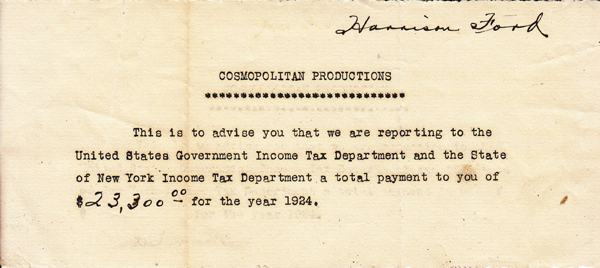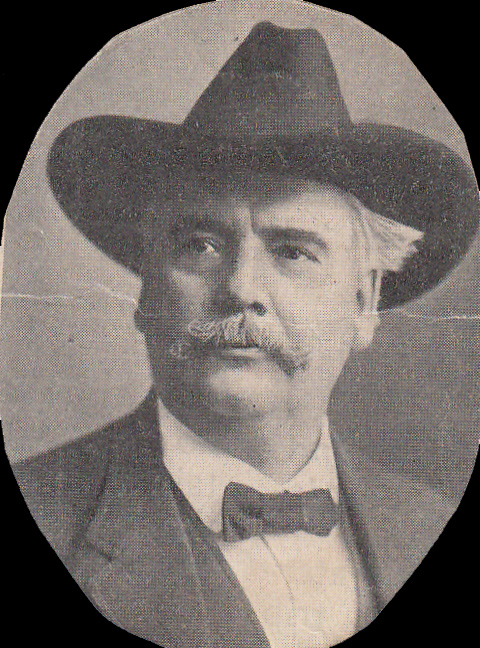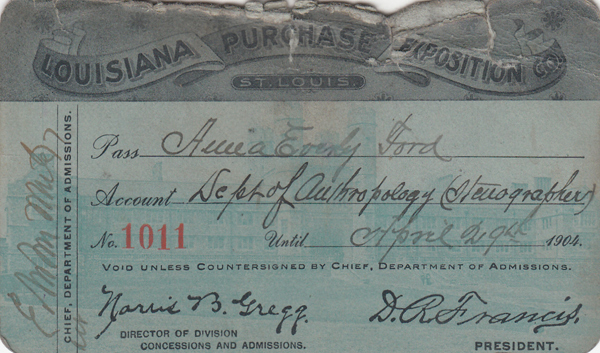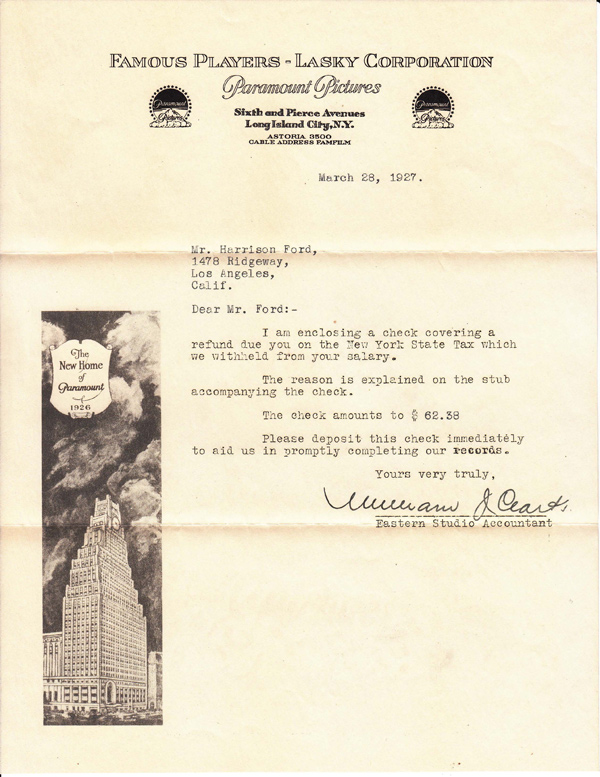The Huntington’s blog takes you behind the scenes for a scholarly view of the collections.
Readers of the Lost Harrison Ford
Posted on Wed., Jan. 29, 2014 by

A record of the salary paid to actor Harrison Ford (but not that Harrison Ford) in 1924. His papers are at The Huntington.
When I say the name Harrison Ford, what do you think of? Han Solo? Indiana Jones? How about Harrison Ford, stage and silent film actor? Yes, there was a Harrison Ford before Harrison Ford, and The Huntington has a small collection of papers that once belonged to him.
Harrison Ford was born in Kansas City, Mo., around 1884, as far as we can tell from his records. He began his acting career on Broadway in 1904 in Richard Hardin Davis’ Ranson’s Follyand proceeded to work continually on stage for several years. In 1909 he married the stage actress Beatrice Prentice. Their marriage was controversial and hidden for a time as she came from a wealthy family who did not approve of the match.

Silent film actor Harrison Ford in an undated photo.
In 1915, Ford moved to Hollywood to try his hand at acting in silent films. He became a leading man and starred opposite Marion Davies and Clara Bow. His last film (and only “talkie”) was Love in High Gear in 1932. In 1934 he returned to the stage, acting and directing at the Pasadena Playhouse and Little Theater of the Verdugos in Glendale, Calif.
Ford was hit by a car in front of his house in Glendale in 1951 and never fully recovered from his injuries. He died in 1957 and was buried in Forest Lawn Memorial Park in Glendale. In 1960, he received a star on the Hollywood Walk of Fame on Hollywood Blvd.
His modest collection, a mix of correspondence and financial documentation, illuminates the life of an actor in the early days of the movie business. We see from his financial accounts that he spent $10 in 1924 for a subscription to the journal Film Daily. Also that year, Ford’s salary from Cosmopolitan Productions was $23,000, and he paid a casting office $700 for its services. We can see from his receipts that he spent hundreds of dollars on clothing, makeup, wigs, publicity, headshots, entertainment, and travel. As mundane as these items seem, they do help scholars get a small glimpse into the life of an actor in the early years of the movie industry. The studio did not pay for everything; Ford was expected to pay for many of the things he needed to perform his job.
In 1925, he signed with the Famous Players-Lasky Corporation for $1,250 per week. In 1927 the company reorganized and changed its name to Paramount Famous Lasky Corporation (it later became Paramount Pictures).
On a more personal note the collection contains tickets to the 1904 Louisiana Purchase Exposition in St. Louis, which Ford attended with his mother, Anna Everly Ford. There is also a telegram from his mother to Ford, dated 1924, in which she says, “Forgive miserable procrastination darling.”

Ford kept personal mementos such as this ticket stub from the 1904 Louisiana Purchase Exposition in St. Louis.
The Huntington also has two letters written by American poet Witter Bynner to Harrison Ford (1924); and several poems written by Ford (ca. 1926). His collection is rounded out with a few books as well.
The collection does not include a photograph of a young Harrison Ford, but there is one photograph (a clipping from a magazine) of an older, white haired gentleman, that may indeed be Ford later in his life. But if you want to see Ford as a young, handsome actor, just do an Internet search for “Harrison Ford silent actor” (you will get lots of hits).
There is no known relation between Ford and the current actor Harrison Ford we all know. The current Harrison Ford was credited as “Harrison J. Ford” in the 1967 film “A Time for Killing,” so he would not be confused with the silent actor Ford. He later dropped the “J.”
Although Harrison Ford (the first) starred in more than 80 films in his lifetime and was a celebrated stage actor, he is not known now. But with this small manuscript collection, his name and story can be discovered again and remembered. His collection joins others at The Huntington that speak to the history of Southern California, the evolution of the movie industry in Hollywood, acting as a profession, the introduction of “talkies,” and a man just trying to live his life.

The Ford papers reveal the mundane details of the working life of an actor.
Brooke M. Black is chief cataloger in the manuscripts department at The Huntington.